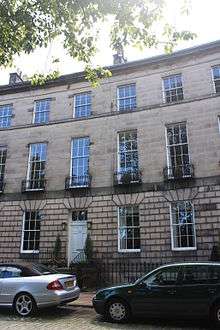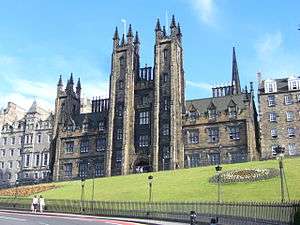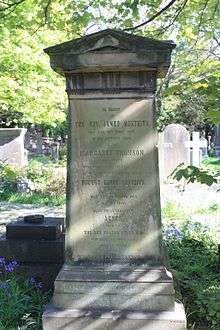Walter Chalmers Smith
Rev Dr Walter Chalmers Smith DD LLD (5 December 1824 – 19 September 1908), was a hymnist, author, poet and minister of the Free Church of Scotland, chiefly remembered for his hymn "Immortal, Invisible, God Only Wise". In 1893 he served as Moderator of the General Assembly for the Free Church of Scotland.[1]




Life
He was born in Aberdeen, the son of Walter Smith, a cabinet-maker living at 16 Blackfriars Street.[2] He was educated at Aberdeen Grammar School.
He studied at Marischal College in the University of Aberdeen and then trained as a Free Church minister at New College, Edinburgh.[3] He was ordained by the Free Church of Scotland in 1850 and sent to minister at the Free Scots Church at Chadwell Street in London. In 1854 he was translated to Orwell Free Church in Milnathort and in 1858 to the Roxburgh Church in Edinburgh. In 1862 he moved to the Tron Free Kirk in Glasgow and in 1876 to the Free High Kirk in Edinburgh (part of the New College building).[4]
Once settled in Edinburgh he lived at 20 Royal Circus in the New Town.[5]
He received the honorary degrees of D.D. and LL.D. He was mentioned in Lord Adam Gifford's will.
He was Moderator of the General Assembly, the highest position in the Free Church, 1893/94 and retired in 1894 on completion of this role. He was succeeded by Rev G. C. M. Douglas.[6]
He died at Kinbuck near Dunblane on 19 September 1908.[7] He is buried in the grave of his father-in-law, Rev James Monteith, in Warriston Cemetery in north Edinburgh. The grave lies just south of the central vaults.
Family
In 1853 he was married to Agnes Monteith (1830–1886) daughter of Rev James Monteith.
Artistic recognition
He was painted by Sir George Reid RSA.[8]
Published works
Smith wrote novels, religious works and poems[9] including
- The Bishop's Walk (1860)
- Hymns of Christ and the Christian Life (1867)
- Olrig Grange (1872)
- Borland Hall (1874)
- Hilda Among the Broken Gods (1878)
- Raban, or Life Splinters (1880)
- North Country Folk (1883)
- Kildrostan (1884)
- Thoughts and Fancies for Sunday Evenings (1887)
- A Heretic and Other Poems (1890)
He attained considerable reputation as a poet. Some of these were written under the names of Orwell or Hermann Kunst.
Hymns
References
- Discipleship Ministries. "History of Hymns: "Immortal, Invisible, God Only Wise" - Discipleship Ministries | Equipping World-Changing Disciples". umcdiscipleship.org. Retrieved 11 February 2018.
- Aberdeen Post Office Directory 1825
- "Walter Chalmers Smith". The Cyber Hymnal. Retrieved 28 August 2010.
- Ewing, William Annals of the Free Church
- Edinburgh Post Office Directory 1880
- Free Church Monthly; July 1894
- "Walter Chalmers Smith". The Canterbury Dictionary of Hymnology. Canterbury Press. Retrieved 11 February 2018.
- "Rev. Walter Chalmers Smith, 1824 - 1908. Free Church minister and poet | National Galleries of Scotland". nationalgalleries.org. Retrieved 11 February 2018.
- "Walter Chalmers Smith (1824-1908). Critical and Biographical Essay by William Garrett Horder. Alfred H. Miles, ed. 1907. The Sacred Poets of the Nineteenth Century". bartleby.com. Retrieved 11 February 2018.
- "Earth was waiting, spent and restless" (PDF). Retrieved 21 March 2008.
- "Immortal, invisible, God only wise". The Cyber Hymnal. Retrieved 28 August 2010.
Further reading
Bailey, Albert Edward (1950). The Gospel in Hymns. New York: Charles Scribner's sons. pp. 455–456.
Julian, John (June 1907). A Dictionary of Hymnology. London: John Murray. p. 1064.
"Gifford Lecture Series". Retrieved 30 January 2007.
![]()
External links
- Biography at the Cyber Hymnal;